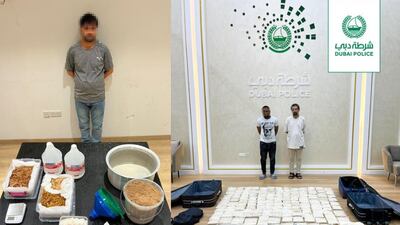Dubai Police thwarted three criminal operations aimed at selling 111kg of drugs with an estimated value of Dh32 million.
About 99kg of the drugs haul was made up of Captagon, which authorities say is the most in-demand narcotic in the Middle East.
Millions of pills are intercepted by customs officials in the Gulf every month as the region continues operations against drug trafficking.
Another 12kg of heroin, crystal meth and cannabis were confiscated following surveillance which led to 28 arrests.
Three gangs were under police surveillance for plotting to import illegal drugs into the Emirates. Police set up a sting operation and seized more than 620,000 Captagon tablets, worth about Dh31 million. They also snared a suspect with 9.7kg of crystal meth.
The peddlers used varied patterns of illegal distribution and hid the drugs in different of the country.
An attempt to sell drugs on social media led to the arrest of 24 more people and the confiscation of heroin, cannabis and crystal meth.
Dubai Police warned of the dangers of social media being used to peddle drugs. They called on members of the public to remain vigilant and to report any suspicious behaviour they encounter online.
Growing threat of Captagon trade
Captagon was created in 1961 as an alternative to amphetamine and methamphetamine, and was used to treat attention deficit hyperactivity disorder and, less commonly, depression.
The drug, however, was never given regulatory approval by the US Food and Drug Administration and in 1981 it was declared a controlled substance after the medical community determined that the drug’s addictive properties outweighed its clinical benefits.
By 1986, manufacturing Captagon had been outlawed in almost every country, but illegal production of the drug continued.
Criminal gangs from Bulgaria and Turkey are believed to have helped to introduce Captagon to the Middle East, where production has flourished in territory beyond the control of fragile states such as Syria and Lebanon.
Today, most of the pills being sold as Captagon across the region have little in common with the tablets produced in the 1960s.
Although stamped with the Captagon logo, these counterfeit pills — often white or yellowish brown in colour — are much less likely to contain fenethylline, the chemical first used in the original tablets.
They are instead more often made up of a mix of other amphetamine derivatives that are easier to produce, as well as additives such as caffeine, quinine and paracetamol.
Trade in the amphetamine-type stimulant Captagon in the Middle East grew exponentially in 2021 to top $5 billion, posing an increasing health and security risk to the region, a 2022 report said.
Research by the New Lines Institute painted an alarming picture of the impact booming Captagon production is having on the region.
“The Captagon trade is a rapidly growing illicit economy in the Middle East and Mediterranean,” said the report, written by analysts Caroline Rose and Alexander Soderholm.





